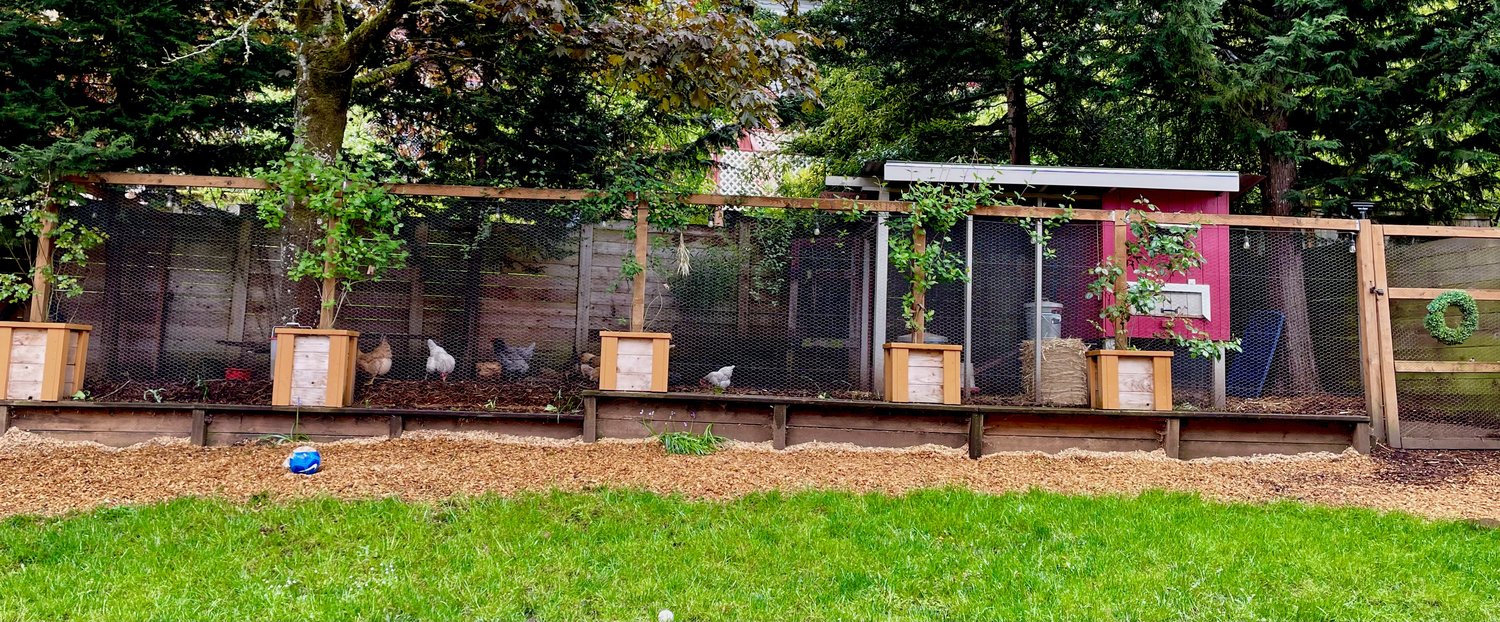Home Is Where The Chickens Are
Home Is Where The Chickens Are
Home Is Where The Chickens Are
Eugene's urban farmers turn to backyard chickens for fresh eggs, fertile gardens, and recycling food waste.

By: Olivia Seits
I stare at the piercing eyes of the creature standing before me. Proudly carrying herself on two scaly feet, this animal's elongated, arched neck guides the rest of her body as she approaches me like a predator about to strike at feeble prey. It hits me that I'm standing in front of a dinosaur.
A dinosaur descendant, to be precise. In Eugene, chickens have evolved to become an agricultural lapdog.
Chickens aren’t a typical household pet, despite their silly nature. They surpass the mere concept of a pet. No longer just a domesticated bird people rely on for eggs and meat, chickens are a part of the community.
In 2022, chickens lived in at least 12 million backyards across the United States. Varying reasons exist for why folks take interest in raising backyard chickens and I’m on a mission to discover those reasons by seeking out four Eugene residents who raise or support backyard chickens. They include Jessika Kaiser, Zach Taylor, Nancy Willcox-Trent, and Kevin Schaffer, who runs a farm supply store and chicken hotel.
Chapter I: The Cleanup Power of Social Butterfly Chickens
A 14-year backyard chicken veteran, Jessika Kaiser now shares her love of hens with her three children, James, Charlotte, and Christopher (Tophie), who currently raise three backyard chickens in Eugene as members of their family and as the designated cleanup crew. The chickens live in a three-by-five-foot homemade coop attached to a 20-foot-long fenced “run,” which serves as the chickens’ playground during the day.
"Many families think eggs are the only reason why you have chickens. But we have far less garbage because of our chickens," says Jessika. "Chickens are a different tier of pet. They serve a specific purpose."
Up to 40% of food is wasted in the United States, and for Jessika, her three kids and three dogs, there is usually a huge pot of miscellaneous leftovers such as moldy fruits and other various foods like popcorn and burritos. Chickens mow down these assorted goods, including weeds from gardens turning this uneaten food into nutrient-dense compost. Jessika schedules kitchen refrigerator clean-out days, where the hens get an ample supply of vegetable and fruit food scraps, little of which is highly processed food to ensure they are eating healthy diets. “The most they get in that department is something like a pasta noodle,” says Jessika.
Jessika’s children also learn how to care for the chickens, tasked with feeding them and ensuring they are in their coops at night. "My kids can learn to identify the plants we're weeding and the bugs in the garden," explains Jessika, "It's like going back to nature a bit more than when caring for just a dog."
It's not all work with backyard chickens, the Kaisers also have fun with theirs. One time they dressed up their hazelnut-colored chicken Squeaky in a light pink and white apron to be blessed by a priest on a playground at the children's Catholic school pet event. “Everybody was like, there's a chicken! There's a chicken! They were going crazy over her” says Charlotte.
The three kids even hold chicken races when one sneaks out of its enclosure. At the top of the garden hill, the hens elegantly waddle their way down to the coop standing on a bed of fertile dirt as the kids monitor their performance. "Yeah, that's what you do for fun," says Jessika.
Chapter II: A Chicken Hobby
Zach and Erin Taylor have raised backyard chickens for three years, with as many as 12 to as few as four in the coop at once. "It's pretty easy to add another chicken," says Zach. The Taylors had a leg up on chicken raising when they moved into their current horse, as a chicken coop had already been built in the backyard. The coop, with a bright red door at the entrance to the laying nest, rests on bark chips and is surrounded by a six-foot-tall wire fence.
"Just the idea of having a pet that gave eggs and was just a little bit different is cool," says Zach, opening the gate to the coop and introducing me to their six chickens who scuttle around on yellow straw covered ground while picking at their cracked corn treats.
"It's like watching little dinosaurs go around," Zach laughs. "They do funny things like bury their food by accident."
Chickens occasionally give themselves dust baths to ward off lice and other parasites. The Taylors have a tin container of fine dust set up inside their coop just for the chickens to avoid rainy conditions. "They like to lay on their sides kicking and ruffling their feathers a lot. It's pretty entertaining."
But raising backyard chickens comes with challenges.
A chicken’s diet determines its health. Zach feeds his hens oyster shells to protect them from calcium deficiencies, which can cause flimsy and transparent eggshells. When Zach’s chickens get sick, he doesn’t always know why because most vets don’t know how to diagnose chicken ailments. “We've had a few illnesses where I've been able to figure out what was going on, but for others, I’ve had no idea,” says Zach “Giving a chicken medicine is also hard because they hate it and they’ll become nervous around you.”
Besides eggs, Zach has also raised chickens for meat, which he finds unpleasant, but believes his two children should understand where their food comes from. "Honestly, it was an eye-opening experience since the chickens would grow so quickly that they couldn't walk after about a month and a half or so because they got so heavy," says Zach.
Zach proudly picks up a gray-toned hen, sitting comfortably perched in the grasp of his palm. Even though chickens tend to be low-maintenance, Zach shares that it's important to plan for these social animals before deciding to raise them. "It's a fun hobby, but don't do it if you're getting chickens just for the eggs. It's not cheaper!"
Chapter III: Garden Friends
Nancy Willcox-Trent opens the front door to her home in West Eugene to greet me with her curly brown dog, Teddy, who slumps over on a reclined chair.
Walking into the backyard, an arch of entangled greenery invites me into the garden of vegetables and flowers set alongside the chicken coop cozied in the back corner of the yard. A 15-year veteran of backyard chicken raising, Nancy’s current flock consists of four hens, whose names are Francis and the Golden Girls' Rose, Blanch, and Dorothy. "They take care of themselves for the most part, so it doesn't feel too hard to raise them," says Nancy.
We stand on freshly laid straw, so we don't sink into the muddy ground, wet from recent rains. Nancy guides me to the laying nest, and she props open the hatch door revealing a partially damp ginger hen with a white patch near her tail. Nancy's interest in raising chickens was piqued by friends who had a flock that produced an abundance of eggs. Nancy’s chickens are also productive egg layers. "The chickens are currently in their prime ages of two and three years old, so we get four eggs per day," says Nancy.
A big challenge for backyard chicken farmers is to protect them from predators like possums and foxes. Nancy has lost eight chickens to these intruders of the night. "A lot of people don't have a roof on their runs to keep predators from entering," says Nancy. "So, when we revamped the coop's run, we encased it with carpenter wire."
Chickens are social creatures, so Nancy often invites her backyard friends to help care for the garden by cleaning up worms and weeds. Nancy uses chicken manure on flower beds as a natural fertilizer, and she mixes baked chicken eggshells into her garden soil to increase the mineral content. "They're good helpers in the fall, but not when I'm planting because they'll eat the new seeds," Nancy says, flashing a smile, "They're food motivated."
Chapter IV: A Local Favorite
As backyard chickens become popular, their owners need a local spot to get feed and supplies for their flocks. Kevin Schaffer and his urban garden store, The Eugene Backyard Farmer, fill that need.
Three years after the store’s original owner Bill Bezuk opened it in 2010, he added a place for chickens to stay overnight. The nation’s first “chicken hotel,” offers backyard farmers a safe haven for their urban flocks while they’re out of town. Schaffer bought the store in 2020 and continues this unique service.
"Chickens are fun, and we're the only place in town, maybe the whole country, that has a chicken hotel," says Kevin as he unlatches the gate into the hen enclosure, where on my left the store's six hens and lone rooster flock about. On my right stands the chicken hotel with its two wooden coops, each able to hold six visiting birds. “Raising your food in any way is more sustainable than a lot of options, which is what we support,” says Kevin.
The hotel charges a bargain $2 per night, which includes food and nesting boxes for these pampered hens. “Hens like confined spaces to lay their eggs in,” says Kevin “They usually like to sleep off the ground, too, so they’ll sleep on the roosting bars we have for them.” Kevin says the chickens even put themselves to bed at sunset because they can’t see well during the night.
The Eugene Backyard Farmer is a staple for the chicken lover community and is a vital support for local backyard farmer’s small flocks. “The Eugene Backyard has nice variety and they’re close by,” says Nancy. “We take care of most of the chicken's food needs ourselves, but we’ve sourced chicks from the store, and they have a lot of knickknack things you need,” says Jessika.
Despite chickens' reptilian ancestry, they intrigue many Eugene locals who are captivated by their many charms and environmentally friendly and convenient existence.
Nancy related an example of that chicken charm. One day, a chicken escaped from her backyard coop to a tall grassy alley behind her yard. Noticing the hen's fondness for the area, Nancy let out the other chickens, taking them on a walk. "It's a great spot for them because it's not really visited by a lot of other animals," says Nancy. "There's a ton of snacks for them back there too!" Now Nancy sometimes walks her chickens during the summer months or lets them dawdle outside the back gate for about a block, letting them explore a new world! "Although it was a walk, it was more like they were walking us," Nancy laughs.


